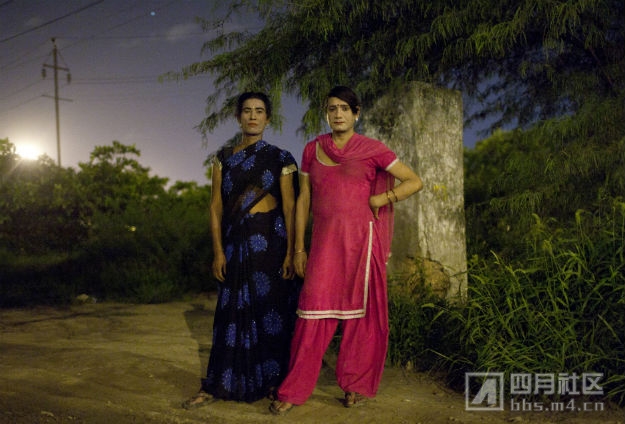|
|
【中文标题】让我们重新思考世界上最古老的职业——性交易
【原文标题】Think Again: Prostitution
【登载媒体】外交政策
【原文作者】Aziza Ahmed
【原文链接】http://www.foreignpolicy.com/articles/2014/01/19/think_again_prostitution

“卖淫不好。”
——取决于你的语境和谈话的对象。
卖淫,或许是世界上最古老的职业,但对于商业化性行为,依然缺少社会、法律和道德上的一致观点。有的人认为性行为神圣不可侵犯,金钱交易是一种犯罪,当然也有一些自由论者愿意接受几乎任何程度的性解放。但更多人的观点则是位于二者之间,他们纠结于公平、制度、甚至越来越多的支持者和从业者所谓的“性工作”的精确定义。
让我们以法国举例。去年秋天,一项提交议会讨论的法律条款是对购买性行为的人处以2000美元的罚款,这引起了广泛的争论。各类抗议者走上街头,女人认为这条法律是有必要的,因为在性产业中广泛存在暴力和强迫现象;谴责这条法律的性工作者打出“惩罚不是预防”的标语。甚至有一群男人给政府写信,要求政府不要碰“我们的婊子”。最终在12月4日,国会下院通过了这条法律。
法国这个事件仅仅是一个例子,全球还有很多与性买卖有关的争议,这个例子同时说明争论的一方经常占据上风。这一方通常是一群古怪的废除主义者,他们认为,因为所有的卖淫都是天经地义的可耻和危险行为,所以必须要禁止。这群人往往来自宗教和其它信仰组织、自由或保守的政治阶层,还有一些是高调的女权主义阵营。(法国这项有争议的法律背后的推动者,就是女权部长Najat Vallaud-Belkacem。)
这一方的影响力极为强大,甚至改变了描述全球性产业的语言表述方式。通常来看,性工作是危险的,必然会触犯女性的权利,让她们成为男性的附属品。性工作和拐卖人口之间似乎并没有明确的界限,它们都要通过威胁和暴力手段控制别人,都以剥削盈利为目的。这种定义让那些自己决定从事性工作的人没有容身之地,他们也是受害者。反拐卖妇女同盟组织说:“‘性工作者’这个词就传达了错误的信息。”
这不仅仅是语言学上的问题。从乔治•W•布什那一届政府开始,美国政府要求,申请资金来从事反对拐卖人口和对抗艾滋病工作的国际组织,必须不能“提倡、支持、主张卖淫合法化”。美国国务院在2013年12月一次项目研讨会中,重申“美国政府反对卖淫及相关行为,因为这本身是有害的、非人性的,而且会助长拐卖人口的现象。”
这样的立场让性工作者和他们的支持者——这些人认为,人们有权选择出售性行为,尽管他们囿于经济条件的选择不会很多——陷入两难境地:他们要么放弃自己的观点,要么失去紧缺的资金。印度一家性工作组织SANGRAM就是一个例子,它拒绝承诺美国总统防治艾滋病紧急救援计划(PEPFAR)所要求的反对卖淫行为。(美国最高法院在2013年否决了这种承诺,认为其违背了言论自由的宗旨。但这仅仅是部分胜利,美国以外的非政府组织依然会遭遇申请资金的种种障碍,最高法院没有评论PEPFAR禁止支持卖淫合法化的立场。)
更糟糕的是,对卖淫行为的反对导致人们无法得到全球性产业的准确数据,包括其最具危害性的数据。2006年7月,美国政府问责局发现美国引用的全球拐卖人口数据值得怀疑,美国国际开发署引用的数据显示,柬埔寨有8万到10万名妇女和儿童被拐卖。但这个数据最早来源于柬埔寨计划部发表的一份报告,其讨论的是这个国家的性工作者人数,其中并未说明哪些是成年人,哪些是人口拐卖的受害者。
为了认识并解决人口拐卖等行为所造成的问题,我们需要一些数据,但更需要了解把性工作作为攻击目标所存在的危险性。这其中包括女性、男性和变性人,他们是一个不可忽视的大群体。废除主义者声称他们要保护人权,但他们的行为总是在削弱这些权利。一些禁止卖淫的运动和项目实际上会导致暴力、伤害和其它问题落在那些他们声称要保护的群体身上。

“宣布其非法就可以消除卖淫行为。”
——不。
有关性工作的法律规定在各个国家有很大的差别。在美国,性交易是非法的(也有一些特例);德国在2002年宣布卖淫合法化;加拿大最高法院在2013年12月推翻了这个国家的反卖淫条例;泰国虽然在很久以前就宣布性工作非法,但性产业在那里几乎是公开的。
废除主义者通常会坚持,法律惩罚是必要的条件。有些人推动立法禁止出售性行为,另一些人——包括反对卖淫的女权主义者——支持另一种做法:仅禁止购买性行为。他们认为惩罚顾客会让性产业失去生意,并解放性工作者,但不把他们当作罪犯。
这种思潮已经取得了一些法律层面的进展。瑞典在1999年禁止购买性行为;挪威和冰岛随后效仿;法国也即将加入这个队伍;德国内部对此问题的争论甚嚣尘上。女权主义者Kathleen Barry是《女性性奴》的作者、反拐卖妇女同盟组织的联合创始人,她甚至呼吁缔结国际协定,授予缔约国“逮捕、监禁和罚款约翰(译者注:代指男性性行为购买者)”的权利。(她最早在90年代初提出这个想法,最近又旧事重提。)
实际上,并没有令人信服的证据证明惩罚“约翰”会降低性交易的数量。而且麻烦的是,瑞典的性工作者说,宣布卖淫非法化只是让性产业转入地下,这带来了危险的后果:顾客更有权力要求他们期望的性行为时间和场所,削弱了性工作者保护自身的能力。
有证据显示,大部分性工作者都来自社会边缘群体,比如女性、少数民族和贫困人口,将性交易定义为犯罪会让这些人更容易遭受执法机构的暴力和歧视。对犯罪的恐惧还会让性工作者在遭到强奸、拐卖或者虐待时,不敢求助于执法机构。很多国家已经出现了这样的问题,开放社会基金会在2012年的一份报告中,记录了美国、俄罗斯、南非、津巴布韦、纳米比亚和肯尼亚等国家的性工作者遭到警察骚扰、敲诈和恐吓的事件。在瑞典,性工作者说他们一直是警察的目标,经常被突袭检查和盘问。
性工作者、他们的支持者、类似全球艾滋病和法律委员会这样的组织,以及越来越多的医学和法律专家,都主张去除禁止成年人自愿与他人发生性行为的法令。毕竟,性交易会无视国家的法律而继续存在。因此,问题并不是如何根除性产业,而是如何让从业者更加安全。去犯罪化可以让性工作者得到政府和国际社会所提供的资源,来更好地应对暴力和拐卖等威胁,同时可以帮助改善他们一直在面对的社会歧视和耻辱。

“我们要救出妓院中的卖淫者。”
——没必要。
一些废除主义者除了呼吁给卖淫量刑定罪之外,还鼓动人们解救性产业的从业人员,也就是“闯”进妓院,找到卖淫者,把他们送入康复中心。解救方案支持者的意见主导了很多反拐卖的组织,他们得到了巨额的国际资金支持。例如,美国政府向国际正义使命和北泰反拐卖组织等机构提供的大笔的资金,这两家机构都积极主张解救行动。
但解救行动远非英雄救美的场景,国际正义使命曾因无法区分性工作者和被拐卖的受害者而遭到批评。一位性工作支持者描述2013年国际正义使命在泰国一家妓院把人强行带出时的反应:“他们吓坏了,说:‘我们不需要解救,这怎么是解救?我们感觉像被逮捕了。’”最近在泰国,执法机构为了回应美国对这个国家反拐卖工作不力的批评,争相采取更严厉的突袭行动。Chavalit Sawaengpuech将军在去年10月份接受国际公共广播电台的采访时说:“2012年,泰国皇家警察厅命令所有的警察局每个月至少有10天从事反人口拐卖的工作。”国际公共广播电台提到,实际上,警察“在努力完成工作定额……即使根本没有证据证明他们解救的性工作者是人口拐卖的受害者。”
从南亚到非洲到东欧,当地执法机构都出现过在突袭过程中施加暴力的现象。2005年,世界卫生组织在一份快报中说,“针对印度尼西亚和印度的研究表明,性工作者在警察突袭过程中被包围并殴打”,以及“腐败的警察官员强迫与他们发生性关系,以换取被释放的机会”。快报中还说:“突袭把性工作者赶上街头,他们在那里更容易遭受暴力。”柬埔寨的问题更加严重,2008年6月,500名性工作者走上金边街头,高呼:“让我们脱离救世主的魔爪。”
所谓的康复中心也不是什么好地方,大部分被“解救”的性工作者都被安置在这些由非政府组织、教堂或者政府运作的机构中。这里号称提供医疗服务、心理安慰和职业技能培训,但很多地方传出施加暴力、关禁闭、阻止性工作者与家人会面的消息。世界卫生组织的快报说,一些印度和印度尼西亚性工作者“在被安置的机构中遭到性侵犯和虐待”。人权守卫组织在柬埔寨的政府康复中心发现殴打、敲诈和强奸等行为。在印度马哈拉施特拉邦,一家康复中心在长时间收容女性之后,甚至建议把她们嫁出去,说这也是康复计划的一部分。
解救行动成功地博得了众人的关注,最著名的报道是《纽约时报》记者Nicholas Kristof在2011年在推特上实时转播一次突袭妓院行动,当然这场行动也遇到了不小的反抗。但是,解救策略不但忽视了那些自愿从事性工作的人,还让性工作者遭到了更严重的虐待。这一事实对那些以人权名义捍卫解救计划的废除主义者来说,是个必须要面对的问题。

“但是Kristof也报道了儿童性奴的现象,我们必须拯救他们。”
——当然,但请稍等。
2011年突袭柬埔寨一所妓院的行动中,专栏作家Kristof在推特中写道:“女孩们被救出,但非常害怕。最年轻的看起来只有13岁,他们都是从越南被拐卖来。”他的报道揭露了一个严肃的事实,性工作的支持者和反对者都极为关心,那就是性产业中的很多人都遭遇过强迫迁移、折磨、囚禁和其它虐待。其中有成年人,也有孩子。我们要不惜一切代价结束这种恐怖行为,孩子决不能被卷入性产业。
在这方面,国际法律和规章明确谴责儿童卖淫行为,包括《儿童权利公约》和《打击跨国有组织犯罪公约》中的规定。联合国儿童基金会明确表示在这个问题上“零容忍”的态度,美国通过《人口贩卖受害者保护法案》(在2013年初重新实施)也明确了自己的法律立场。其它很多国家也有自己的反人口拐卖立法。
然而讽刺的是,目前所采取的停止对儿童性剥削的努力,往往会让他们遭受伤害。在很多国家,当局的行动让被拐卖的儿童遭受和成年性工作者同样的待遇,解救儿童的突袭行动也同样面临“解救”成年人那样的挑战。人权守望组织对柬埔寨的调查发现,被从性产业中带出来的儿童被迫向警察支付贿赂,在政府经营的康复中心经常受到虐待。而且,政府通常会采取“无差别的解决方案”应对所有的拐卖事件,而没有针对每个儿童的特殊背景采取不同的方式。国际反奴组织的前总监Mike Dottridge曾写道:“我们需要一个可以适用于所有孩子的政策,如果不能区分现实中每一起事件的特殊性,这实际上是在伤害儿童。”
这样的问题不仅仅出现在美国以外,国会研究服务2011年的一份报告中说,美国国内性产业中的孩子也经常被逮捕,送入青少年管制中心,“而不是被送入一个他们可以得到社会保护的环境中”。医学和国家研究委员会在2013年9月份的一份报告中同样提到,截止到2012年初只有9个州实施了一项法律,确保被控卖淫的未成年人免予起诉。
因此,目前拯救性产业中儿童的很多努力既不安全,也不公平。扭转这个糟糕的局面需要改进有关拐卖人口的法律、设计更加合理的干预计划、改善目前这个未成年人容易受到伤害的社会经济环境、认真聆听他们的声音。还需要尊重性工作者,并与他们交流,这也是解决问题的一个方法,而不是添麻烦。毕竟,性工作者通常最早了解到有人被强迫卖淫——包括儿童,他们也是人口拐卖受害者最开始的求助对象。

“卖淫传播疾病。”
——这是站在错误的角度看待一件事情。
性工作者长久以来背负着传播疾病的耻辱罪名。在上世纪40年代,美国政府的海报告诫士兵不要购买性行为,口号包括“她看起来很干净,但是……”和“疾病会伪装”。在艾滋病肆虐期间,政府把性工作者视为传播这种致死病毒的媒介,以保护公共健康为借口,定期打击性工作者和卖淫场所。最近,包括希腊和马拉维在内的一些国家当局逮捕性工作者,强迫他们做艾滋病毒检测,这明显触犯了人们的健康和隐私权。
坦率地说,性产业的确存在一些危害公共健康的因素,包括高比例的性途径疾病传播。但是,惩罚和羞辱绝不是解决方法。同样,对其定罪只会阻碍医疗服务的介入。世界卫生组织在2012年说:“那些直接或间接给性工作者、性消费者以及第三方定罪或者使其接受惩罚的法律……极大地削弱了艾滋病和性健康项目的推广力度。”
更有甚者,在美国几座大城市,警方逮捕了一些随身携带安全套的性工作者,说这是他们违法行为的证据。因此一些性工作者对记者和活动人士说,由于害怕警察,他们有时就不带安全套,在提供性服务时缺少了保护。
与此相反,我们应该做的是要保护,而不是迫害性工作者。在“减少伤害”的大前提下,我们可以利用世界卫生组织和联合国艾滋病规划署的支持,从事一些发放安全套、教育性工作者有关艾滋病和健康风险的知识、为他们提供体检、药物和咨询服务等工作。这些工作目前都是性工作者们自己在开展。在印度,SANGRAM监控安全套的试用,关爱患艾滋病的性工作者,甚至阻止那些有暴力倾向的顾客进入妓院。同时应当制定点对点的反人口贩卖机制以减少伤害,就像SANGRAM目前的做法一样。Meena Saraswathi Seshu在2013年接受联合国新闻机构IRIN采访时说:“性工作者权利组织应当真正介入反人口贩卖工作,因为毕竟还是他们最了解性产业和他们的工作环境,因此更擅于做这项工作。”
这些举措可以减少很多潜在的伤害。象牙海岸在90年代实施的“信心诊所”项目——女性可以在这里得到心理咨询、身体检查、传染病检测——让女性性工作者的艾滋病感染比例从89%降低到32%。在印度南部,从1995年到2008年,免费发放安全套的医疗服务让性工作者的艾滋病和梅毒感染数量大幅度降低。
尽管取得了这些成就,减少伤害的努力仍然缺少足够的支持。据联合国艾滋病规划署在2009年提供的数据,全球防止艾滋病的总预算中,只有不到1%被用在与性产业有关的项目上。这其中的原因至少部分来自于经常破坏医疗项目进程的废除主义者。例如一个孟加拉国组织Durjoy Nari Shangho在国际非政府组织签署了美国的反性交易承诺书之后,关闭了一家性工作者的医疗中心,因为它无法继续得到资金支持。医生无国界组织拒不参加一个柬埔寨和越南边境的项目,因为美国国会批评它支持性交易行为。
减少伤害的举措,如果被更多的人接受、被更广地传播、被更有力地提升其重要性,将会在保护性工作者健康方面发挥重要的作用。但它不应当孤独地存在,它应当与去犯罪化和更广泛的司法、社会进步结合起来,性产业最终才可以走上正轨。

“一个性工作者工会?!”
——没错。
在反对法国立法禁止购买性行为的抗议中,有人打出“性工作也是工作”的口号。的确如此,因为这是一项工作,它就要和其它工作一样被对待。今天,有一批法律专家表示,性工作者面临的很多问题都可以通过劳动法来解决。如果性工作也被认为是一个合法的经济组成部分,工作条件、标准工资、伤害赔偿和其它的雇用问题都可以参照相关法律,那么性产业和性从业者都将遭遇更少的暴力和伤害。
按照一个标准的劳动法模式,美国性工作者可以把妓院中存在的健康危害上报给职业安全与健康管理局,他们可以组建工会,游说当局采取更严厉的措施保护他们不受警方的骚扰。在未来,他们会被当作和其他人一样的普通公民,他们的职业也是安全和可以接受的。特拉维夫大学法律教授Hila Shamir说,尊重所有行业劳动者的权利可以解决很多导致人口贩卖的社会和经济问题。性产业也是如此:提供一个安全的工作环境,可以减少职业暴力,同时性工作者也不大容易受到金钱和其它好处的引诱移居到国外。
听起来具有煽动性?或许吧。但是已经有了一些研究结果显示劳动法模式起到了一些作用。
性工作者的贸易工会已经出现在英国和其它一些欧洲国家,新西兰甚至已经为性产业提供从业者保护机制。支持性产业的组织开始利用法院来维护他们的劳动者权利。南非一家上诉法院在2010年裁定,一个自称被一家按摩院不公平解雇的性工作者(据《Mail & Guardian》报道,被解雇的原因是“拒绝口交、私会男友、挑选顾客、接客数量不够”)有权出席政府机构的听证会,以解决劳资纠纷。在这起案件背后起到推动作用的是位于开普敦的性工作者教育和宣传工作小组。
与正规工会运作的模式相类似,性工作者组成的团体也可以与妓院老板和警方面对面地解决问题。据联合国艾滋病规划署提供的信息,泰国的一个团体“服务行业从业人员组织”利用一个“实习”计划改善了与警方的关系。警察学员在这个项目中可以学到防治艾滋病的知识,还可以结识组织成员。警方因此改变了对性产业的态度。研究人员在2009年从事的一项研究还发现,印度南部的一个性从业者团体在面对警方的骚扰和其它危险时,相互帮助,共同阻止了警方的逮捕行动。
所有这些例子都让我们看到,工会有机会改善性工作者的生活条件。然而,彻底转变公众的态度不是件容易的事。除了转化并消除废除性产业的观念之外,我们还需要重新分配资源、修改并去除那些错误的政策。还要留心可能引起的反抗,就像去年9月出现的全球抗议声音,反对卖淫的人士因为联合国多次表示支持性产业去犯罪化,因此威胁联合国。
然而,无论是研究还是经验都表明,变化是性工作者权利的核心所在——这恰恰是废除主义者声称他们要保护的东西。性工作者不但应当享有选择谋生方式的权利,还应当享有不受恐惧和虐待的权利。更重要的是,他们不应被长久以来污染这个产业的误解和偏见所伤害。
原文:
"Prostitution Is Bad."
DEPENDS ON WHAT YOU MEAN AND WHOM YOU ASK.
Prostitution may be the world's oldest profession, but there is still little agreement on the social and moral legitimacy of commercial sex. There are, of course, those who consider sex sacred and its sale a sin, and there are libertarians who are willing to accept nearly any degree of sexual freedom. But plenty of people have views that lie somewhere in between, and they are fighting over the fairness, regulation, and even the precise definition of what advocates and practitioners increasingly refer to as "sex work."
Take France, for instance, where a debate erupted last fall over a proposed law that would fine people $2,000 for purchasing sex. All sorts of protesters took to the streets: women arguing that the law was necessary because violence and coercion are endemic to the sex industry, and sex workers, hoisting posters with slogans like "La repression n'est pas la prevention," who condemned the law. A group of men also insisted in a letter that the government take its hands "off our whores." Ultimately, on Dec. 4, the lower house of Parliament adopted the measure.
The French case is but one example of a global dispute about what constitutes exploitation in the sale and purchase of sex -- and it also shows that one side of the argument often has the upper hand. That side, a group of odd bedfellows frequently called abolitionists, thinks that because all prostitution is inherently degrading and dangerous, it must be eliminated. The group draws from, among others, religious and faith-based organizations, both liberal and conservative political ranks, and some outspoken feminist camps. (The driving force behind the controversial measure in France is Women's Rights Minister Najat Vallaud-Belkacem.)
So strong is the influence of this group that it has shaped the language typically used to describe the global sex industry. In common parlance, sex work is a dangerous phenomenon that routinely violates women's rights and perpetuates their subordination to men. There is hardly a distinction drawn between sex work and human trafficking, which involves controlling someone through threats or violence with the express purpose of exploitation. This conflation leaves no room for sex workers who make decisions for themselves; they are all just victims. "The term 'sex worker' is false advertising," says the Coalition Against Trafficking in Women.
This is more than a semantic issue. Since George W. Bush's administration, the U.S. government has required that international organizations receiving funding for efforts to combat trafficking and HIV/AIDS must not "promote, support, or advocate the legalization or practice of prostitution." In an October 2013 call for project proposals, the State Department reiterated, "The U.S. Government is opposed to prostitution and related activities, which are inherently harmful and dehumanizing, and contribute to the phenomenon of trafficking in persons."
This stance has put sex workers and their advocates -- who support the idea that some people choose, although perhaps from a range of poor economic options, to sell sex -- in an impossible position: They must make a choice between compromising their principles or missing out on opportunities for much-needed money. Such was the case with SANGRAM, a sex workers' collective in India that refused to adopt an anti-prostitution pledge required by the U.S. President's Emergency Plan for AIDS Relief, or PEPFAR. (The U.S. Supreme Court struck down the pledge as a violation of free speech in June 2013, but this was only a partial victory: Foreign, as opposed to U.S.-based, NGOs could still be barred from receiving funds, and the court did not address PEPFAR's ban on advocating the legalization of prostitution.)
To make matters worse, the influence of prostitution's vocal opponents has contributed to a dearth of good data on the global sex industry, including its most harmful aspects. In July 2006, the Government Accountability Office (GAO) acknowledged that U.S.-cited statistics of people trafficked around the world are questionable. The GAO highlighted a figure, cited by the U.S. Agency for International Development (USAID), that there are 80,000 to 100,000 trafficked women and children in Cambodia. But that number came, originally, from a publication by Cambodia's Ministry of Planning that discusses the total number of sex workers in the country; there is no breakdown of who is an adult or who is a victim of trafficking.
To better understand and address enormous wrongs like trafficking, we need good data. But that first requires grasping the dangers of targeting sex work -- which involves women, men, and transgender populations -- writ large for elimination. Abolitionists say they want to protect human rights, but their efforts often undermine those rights: Campaigns and programs to end prostitution in fact lead to violence, stigmatization, and other problems for the exact people they claim to be helping.
"We Can Abolish Prostitution by Making It Illegal."
NO.
Laws regulating sex work vary widely among countries. It's illegal to buy and sell sex in the United States (with some exceptions). Germany legalized prostitution in 2002, and in December 2013, Canada's Supreme Court struck down the country's anti-prostitution measures. Thailand, meanwhile, has long outlawed sex work, yet the industry operates quite openly there.
Abolitionists typically insist that criminalization is imperative. Some have pushed for making the sale of sex illegal. Others, however, including feminists who oppose prostitution, support a different model: outlawing only the purchase of sex. They argue that criminalizing clients will force the sex industry out of business, liberating sex workers but not treating them as criminals.
Already, this model has achieved legislative success. Sweden outlawed buying sex in 1999; Norway and Iceland later followed suit. France is on the verge of joining the club, and a debate on the issue is even gaining steam in Germany. Feminist Kathleen Barry, author of Female Sexual Slavery and co-founder of the Coalition Against Trafficking in Women, has even called for an international treaty that would mandate "arresting, jailing and fining johns." (She first introduced the idea in the early 1990s, but has recently revived it.)
In reality, there is no convincing evidence that punishing "johns" decreases the incidence of commercial sex. Troublingly, Sweden's sex workers report that criminalization has simply driven the sex industry underground, with dangerous consequences: Clients have more power to say when and where they want to have sex, inhibiting workers' ability to protect themselves if need be.
Evidence shows, too, that criminalization of sale or purchase (or both) makes sex workers -- many of whom come from marginalized social groups like women, minorities, and the poor -- more vulnerable to violence and discrimination committed by law enforcement. Criminalization can also dissuade sex workers from seeking help from authorities if they are raped, trafficked, or otherwise abused. These problems have been identified in many countries: A 2012 report by the Open Society Foundations documented sex workers being harassed, extorted, and intimidated by police in the United States, Russia, South Africa, Zimbabwe, Namibia, and Kenya. And in Sweden, sex workers have reported that they are still targeted by police, including for invasive searches and questioning.
Sex workers, their advocates, institutions like the Global Commission on HIV and the Law, and a growing number of experts in health and law argue for removing all criminal prohibitions for consenting adults. After all, sex will be bought and sold no matter a country's laws. The question, then, isn't how to get rid of sex work -- it's how to make it safe for those who do it. Decriminalization would allow sex workers access to government and international resources so they could better respond to threats like violence and trafficking, while also helping to ameliorate the social stigma and prejudice they so often face.
"We Should Rescue Prostitutes From Brothels."
NOT NECESSARILY.
On top of arguing for criminalization, some abolitionists agitate for actively removing people from the sex industry -- that is, entering brothels in "raids," pulling sex workers out, and placing them in rehabilitation programs. Proponents of rescues, whose views dominate many anti-trafficking organizations, have secured substantial international funding. The U.S. government, for example, has given grants to organizations like the International Justice Mission (IJM), a faith-based group headquartered in Washington, D.C., and the Anti-Trafficking Coordination Unit Northern Thailand, both of which actively promote rescues.
But rescues are often far from heroic. IJM has been criticized for failing to distinguish between sex workers and trafficking victims. Describing the response among people pulled from a Thai brothel in a 2003 IJM raid, a sex worker advocate told the Nation, "They were so startled, and said, 'We don't need rescue. How can this be a rescue when we feel like we've been arrested?'" More recently in Thailand, law enforcement has scrambled to respond to U.S. criticisms of the country's anti-trafficking record by stepping up raids. "[In 2012], the Royal Thai Police ordered all police units to spend at least 10 days each month doing anti-trafficking work," Gen. Chavalit Sawaengpuech told Public Radio International (PRI) this past October. In effect, PRI noted, the police are "trying to meet a quota … even where there isn't data or evidence indicating the sex workers they are rescuing are victims after all."
Violence perpetrated by local authorities during raids has also been documented from South Asia to Africa to Eastern Europe. In 2005, the World Health Organization (WHO) wrote in a bulletin that "research from Indonesia and India has indicated that sex workers who are rounded up during police raids are beaten" and "coerced into having sex by corrupt police officials in exchange for their release." The bulletin added, "The raids also drive sex workers onto the streets, where they are more vulnerable to violence." So rampant have these problems with police become in Cambodia that, in June 2008*, more than 500 sex workers rallied in Phnom Penh, chanting, "Save us from saviors."
Also troubling are some of the rehabilitation centers -- run by NGOs, churches, or governments -- where "rescued" sex workers are placed. These centers profess to offer medical care, counseling, and vocational training. Yet many are known for perpetrating violence, detaining individuals, and separating them from their families. The WHO bulletin stated that some Indian and Indonesian sex workers are "placed in institutions where they are sexually exploited or physically abused." In Cambodia, Human Rights Watch (HRW) has documented beatings, extortions, and rape at government rehabilitation sites. And in the state of Maharashtra, India, in addition to holding women for long periods of time, a rehabilitation home has suggested that marrying them off is a mode of rehabilitation.
The rescue approach certainly makes for good optics. It has been covered, notably, by Nicholas Kristof of the New York Times, who live-tweeted a brothel raid in 2011. And the impulse to protect is surely a noble one. But in addition to ignoring that some people choose to sell sex, rescues have subjected sex workers to a whole host of abuses -- a fact certainly problematic for the abolitionists who champion such interventions in the name of human rights.
"But Kristof Writes About Child Sex Slaves -- and We Have to Save Them."
OF COURSE, BUT HOLD ON.
During the brothel raid Kristof covered in 2011, which took place in Cambodia, the columnist tweeted, "Girls are rescued, but still very scared. Youngest looks about 13, trafficked from Vietnam." His discovery highlighted an abhorrent reality that concerns both advocates and opponents of sex work: Many in the sex industry endure forced migration, torture, captivity, and other wrongs. Some of these people are adults, but others are young girls and boys. We should do all that we can to end these horrors, and no child should be involved in the sex industry.
To that end, international laws and standards explicitly condemn child prostitution, including a protocol to the Convention on the Rights of the Child and another to the Convention Against Transnational Organized Crime. UNICEF has expressed a "zero tolerance" policy on the issue. The United States, meanwhile, has taken its own legal stand with the Trafficking Victims Protection Act (reauthorized in early 2013), and many countries have their own anti-trafficking legislation.
Yet, ironically, current efforts to end the sexual exploitation of children often endanger them. In many countries, authorities victimize trafficked children the same way they do adult sex workers. Raids to save children are engulfed in the same sort of challenges as the ones seeking to "liberate" adults; HRW's report on Cambodia found that children pulled from the sex industry were forced to pay bribes to the police and faced mistreatment at a government rehabilitation center. Moreover, governments frequently adopt "blanket solutions" to address trafficking, failing to acknowledge that each child's circumstances are different. "While policies are evidently needed which can be applied to all children," Mike Dottridge, former director of Anti-Slavery International, has written, "if they do not take account of the huge variations which occur in reality, they are likely to harm children."
These problems don't just exist outside the United States. Children in the U.S. sex industry are often arrested and put into the juvenile detention system "instead of in environments where they can receive needed social and protective services," noted a 2011 Congressional Research Service report. A September 2013 report by the Institute of Medicine and National Research Council also found that, as of early 2012, only nine states had enacted laws ensuring that minors accused of prostitution are exempted from prosecution.
Currently, then, many efforts to save children from the sex industry are neither safe nor fair to them. Correcting that poor record will mean improving laws that target human trafficking, dedicating more resources to quality interventions, addressing the social and economic conditions that make minors vulnerable to exploitation, and making sure their voices are heard. It also means respecting and engaging adult sex workers and their advocates as part of the solution, not the problem. After all, sex workers are often the first to notice those being coerced into selling sex -- including children -- or they are the first individuals whom trafficking victims reach out to for help.
"Prostitution Spreads Disease."
WRONG WAY TO LOOK AT IT.
Sex workers have long carried the stigma of being vectors of infection. In the 1940s, U.S. government posters discouraged soldiers from purchasing sex with slogans like "SHE MAY LOOK CLEAN -- BUT" and "DISEASE IS DISGUISED." Throughout the HIV epidemic, governments have targeted sex workers for spreading the deadly virus. Crackdowns on places and people who sell sex have been routine, carried out under the auspices of protecting public health. Recently, in countries like Greece and Malawi, authorities have arrested sex workers and forced them to undergo mandatory HIV testing, a clear violation of health and privacy rights.
To be sure, there are public health concerns surrounding sex work, including high rates of sexually transmitted infections. But punishment and humiliation cannot possibly be the answer. Similarly, criminalization only impedes access to medical care. In 2012, the WHO stated, "Laws that directly or indirectly criminalize or penalize sex workers, their clients and third parties … can undermine the effectiveness of HIV and sexual health programmes."
What's more, in the United States, police in several major cities harass or arrest sex workers carrying multiple condoms, citing them as evidence of illegal activity. In response, some sex workers have told reporters, activists, and others that, fearing police, they sometimes do not carry condoms -- and thus end up having sex without them.
What we should be doing instead is focusing on protecting, not persecuting, sex workers. Grouped under the banner of "harm reduction" -- and supported by the WHO and UNAIDS -- are programs that distribute condoms, educate sex workers about HIV and other health risks, and provide them checkups, medicine, and counseling. These programs are sometimes run by sex workers themselves. In India, SANGRAM monitors condom use, cares for sex workers with HIV, and even works to bar violent customers from brothels. Anti-trafficking initiatives can also be built into peer-to-peer programs of harm reduction, as SANGRAM has done. "Sex worker rights groups should be involved in the genuine anti-trafficking work because, at the end of the day, they know their industry and their spaces and they're better at it," SANGRAM's Meena Saraswathi Seshu told the U.N. news agency IRIN in 2013.
The results of harm reduction can be dramatic. In the Ivory Coast, a 1990s prevention campaign at "Clinique de Confiance," where women received counseling, clinical exams, and testing for infections, contributed to a decline in HIV prevalence from 89 to 32 percent among participating female sex workers. In southern India, between 1995 and 2008, an increase in health interventions that supplied condoms led to a drop in the prevalence of both HIV and syphilis among sex workers.
Yet despite these successes, harm reduction receives insufficient support; according to UNAIDS in 2009, less than 1 percent of global funding for HIV prevention was being spent on HIV and sex work. At least in part, this is due to abolitionists, who have at times disrupted important health initiatives. For example, Durjoy Nari Shangho, a Bangladeshi organization, shuttered drop-in centers for sex workers after the international NGO from which it received funding signed the U.S. anti-prostitution pledge. Similarly, Doctors Without Borders distanced itself from a project on the Cambodia-Vietnam border after U.S. congressional testimony criticized it for promoting sex work.
Harm-reduction programs, if more widely accepted, spread out, and scaled up, would go a long way toward protecting sex workers' health. But they shouldn't exist in isolation. They should be coupled with decriminalization and broader legal and social efforts to normalize the sex industry.
"A Sex Workers' Union?!"
THAT'S RIGHT.
During demonstrations against France's proposed bill to criminalize the purchase of sex, some protesters carried signs that read "SEXWORK IS WORK." This is true -- and because it's work, it should treated as such. Today, a camp of legal experts contends that the many problems sex workers face can be addressed with labor laws. If sex work were considered a legitimate economic sector, the argument goes, where work conditions, fair wages, injury compensation, and other basic employment issues were matters of law, the sex industry and those within it would be less exposed to violence and other harms.
Under a labor model, U.S. sex workers could report health risks at brothels to the Occupational Safety and Health Administration. They could unionize and lobby for stronger protections against police harassment. In the long run, they would be viewed as citizens like any other, and their industry as a safe and acceptable one. What's more, law professor Hila Shamir at Tel Aviv University has argued that respecting labor rights in all sectors could help address many of the social and economic forces that lead to trafficking. The same goes for the sex industry: Ensuring safe work environments would decrease exploitation and make it less enticing for sex workers to migrate abroad based on the promise of more money or other benefits.
Provocative? Perhaps. But early research already shows that the labor model can work.
Already, trade unions of sex workers have launched in the United Kingdom and other European countries, and New Zealand has applied labor protections to the sex industry. Advocacy groups have also begun to use courts to defend their labor rights. In South Africa, an appeals court ruled in 2010 that a sex worker who said she'd been unfairly fired from a massage parlor ("for refusing to perform oral sex, spending time in her room with her boyfriend, choosing her clients and failing to book enough customers," according to the Mail & Guardian) had a right to a hearing before a government body that settles labor disputes. Assisting with the case was the Cape Town-based Sex Workers Education and Advocacy Taskforce.
In lieu of formal unions, sex workers' collectives also assert power vis-à-vis brothel owners and police. According to UNAIDS, Service Workers in Group, a collective in Thailand, was able to improve relationships with the police force by introducing an "internship" program, in which police cadets learn about HIV prevention and get to know collective members. This has helped improve police attitudes toward sex work. Moreover, researchers found in a 2009 study that sex workers in collectives in South India have been able to deter arrest and call on one another for assistance when faced with police harassment and other issues.
All these examples show the ways in which a labor approach can improve sex workers' lives. Yet moving public favor toward this model won't be easy. Beyond changing minds and diminishing support for abolishing sex work, it will require reallocating resources and amending or throwing out harmful policies. It will also require managing backlash, like the international protest that opponents of prostitution threatened the United Nations with last September, in response to the body's various reports supporting the decriminalization of sex work.
As research and experience show, however, change is essential for the rights of sex workers -- the very thing abolitionists claim they wish to protect. Sex workers deserve not only the right to choose how they make a living, but also the right to be free from the fear, mistreatment, and -- at the root of it all -- misconceptions that have long plagued their industry.
|
评分
-
1
查看全部评分
-
|
